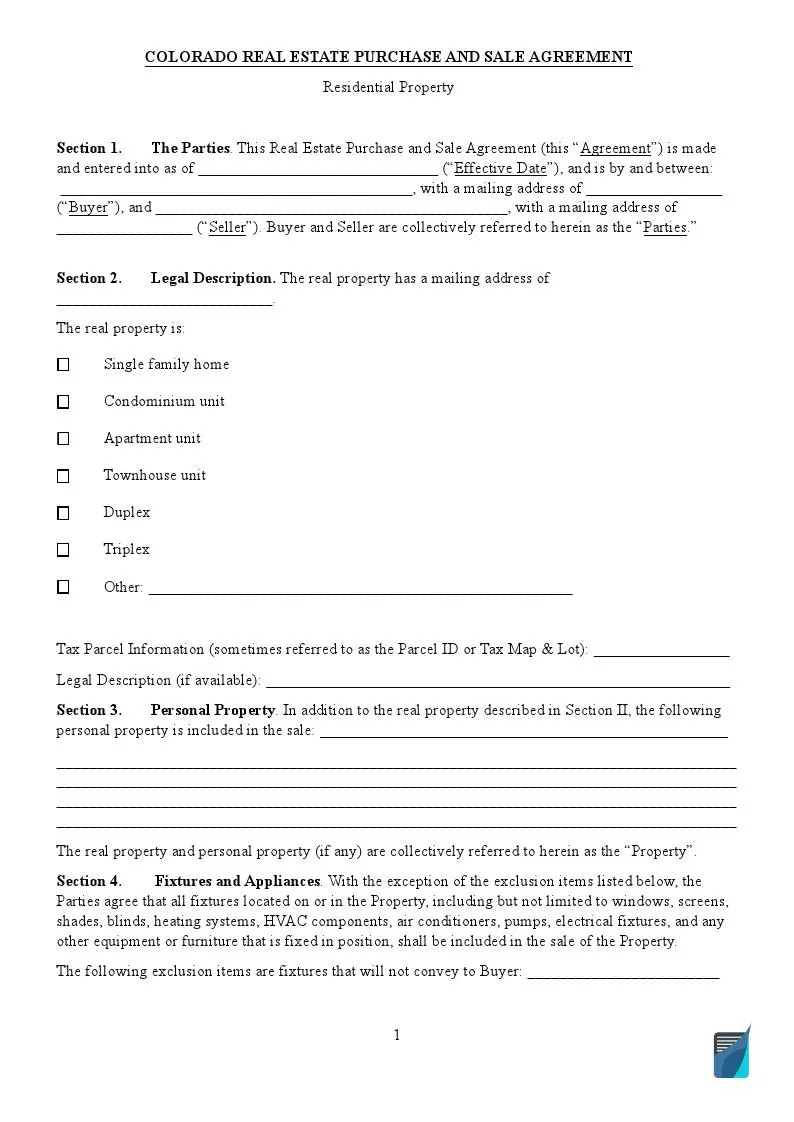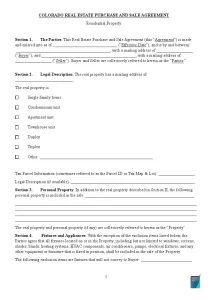Colorado Real Estate Purchase Contract
Real estate purchase covenants conclude the process of property ownership transfer between individuals or business entities. The Colorado real estate purchase agreement intends to capture the negotiations between the trader and the acquirer, the terms of the arrangement, liabilities of both parties, and other inherent details, including the buying price and the dates on paper.
In most US states, the seller should inform the buyer of possible estate defects and hidden hazards. However, some states do not follow this law, so the property seller does not have to mention material breaks. Colorado is one of the states that maintain the “buyer beware” policy. It means the buyer complies with the terms and understands the property’s condition may differ from the pre-sale inspection condition. We highly recommend that the buyer learns all vital information regarding the estate before appending their signature.

Build Your Document
Answer a few simple questions to make your document in minutes
Save and Print
Save progress and finish on any device, download and print anytime
Sign and Use
Your valid, lawyer-approved document is ready
To neutralize possible emergencies like refusing to buy the premises, the seller sometimes opts to earnest money deposit receipts. When both parties enter the purchase covenant, the seller may ask for a guarantee in case the acquirer changes their mind halfway. As a rule, the rate equals 1% to 3% and is not refundable. The money is exchanged for the slip given to the purchaser of the premises. On the other hand, if the seller breaks the contract halfway, the buyer has the right to initiate a claim.
Colorado recognizes several types of real estate purchase covenants. We encourage you to read the review till the end to learn the essential requirements and responsibilities included in each kind of covenant established and recognized in Colorado.
Colorado Residential Purchase and Sale Agreement
Colorado citizens should negotiate a purchase agreement to acquire and sell residential real property. The document guarantees that both parties become subject to certain liabilities and acquire certain rights. Following Colorado statutes, landlords and sellers should provide information about the premises’ potential hazards.
Although Colorado appears to be one of the “buyer beware” territories, the trading party should mandatorily provide detailed supporting documentation. You are welcome to read about the disclosure requirements in the following sections of this article.
A standard real estate sales contract should include the below-listed aspects:
- Parties’ identities
- Parties’ mailing addresses
- The premises legal description and physical address
- Personal assets included in the transaction
- Earnest money terms (if applicable)
- Purchase price and financing terms
- Closing expenses and conditions
- Title transaction terms
- Real estate and assets condition
- Jurisdiction
- List of disclosures
- Other terms and conditions
- Parties’ authorization
Colorado Commercial Purchase and Sale Agreement
To ensure a successful transaction of commercial real property, both parties should comply with the state requirements. All inherent terms must be reflected in the purchase and sale covenant. If the parties do not feel qualified enough to conduct legal negotiations, they can rely on professional representatives to complete the agreement.
Ensure that your Colorado commercial purchase and sale agreement contains the following key features and details:
- Identities of the parties
- Price
- Earnest money guarantees
- Financing details
- Ownership transfer terms
- Deadlines and closing dates
- Authorization
Despite providing the mandatory disclosure documents advanced by Colorado, the seller and the purchaser must sign the covenant. After the acknowledgment, the new owner and their agent must provide a due diligence inspection of the property.
Required Seller Disclosures in Colorado
Before acquiring a residential or commercial property, the purchaser is advised to examine the estate and learn all necessary details. After the agreement is signed, it becomes challenging to claim compensation for any hazardous issues or material damages. Still, Colorado advances some obligatory requirements to protect the acquiring party from unfavorable risks.
Actually, if the seller intentionally or accidentally conceals conditions that may negatively affect the health of the potential owner(s), the seller may be subject to fines and legal liability for nondisclosure.
Lead-Based Paint Disclosure
This documentation is needed if the property was built before 1978. Colorado demands that all sellers provide proof that the building contains lead-free paint. If the premises under discussion were constructed before 1978, the seller should offer the Protect Your Family from Lead in Your Home brochure. The procedure is supported by Chapter 63A, Title 42 of the US Code. Lead-based paint disclosures must be presented to the buyer before the contract is written and signed.
Special Taxation Disclosure
If the premises are located in an area with specific taxation conditions, the seller should disclose the details within the purchase and sale covenant. The matter is regulated by § 38-35.7-101 of the Colorado Revised Statutes.
Common Interest Community Disclosure
If the estate is included in the common interest community structure, the seller should inform the purchaser about such a fact in the agreement. The disclosure act is regulated by §38-35.7-102 of the Colorado Revised Statutes.
Methamphetamine Lab Disclosure
Following §38-35.7-103 of the Colorado Revised Statutes, the seller must inform the buyer if the premises have ever been utilized as a methamphetamine lab. The disclosure is optional if all traces have been removed in full. However, the purchaser’s right to inspect the premises on methamphetamine lab issues should be reflected in the covenant.
Green Disclosure
If the real estate is outfitted with energy-related options and constructions, the seller should submit the data to the potential purchaser. The seller completes a particular form and attaches the document to the agreement for the property.
Potable Water Disclosure
Provide the drinkable water disclosure within the agreement to comply with §38-35.7-104 of the Colorado Revised Statutes.
Transportation Projects Disclosure
If any transportation project is expected near the premises and the existence of the lines might affect the subject real estate, related disclosures should be supplied and submitted with the covenant. This requirement is regulated by §38-35.7-105 of the Colorado Revised Statutes.
The Bottom Line
Elaborately consider the deadlines when the required disclosures should be reported to the buyer. The submission dates rely on the aspect disclosed. All special terms are negotiated between the parties and should be reflected in the agreement.
